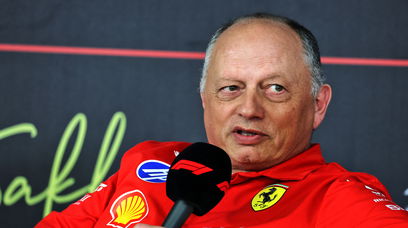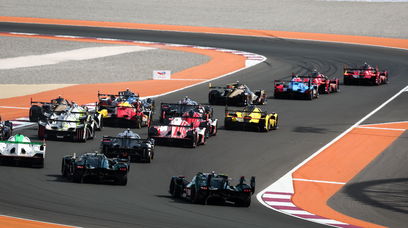"Obviously what's going on in Russia and that part of the world at the moment is of huge concern to everybody," said a senior Formula 1 team figure when asked about racing in the country. "But we've always said as a sport we try to disengage from taking a political angle on these things. The FIA is the governing body of our sport, they issue a calendar, and we take our direction from them." These words could well have echoed the thoughts and feelings of many during last week's pre-season test session in Montmelo, but the twist is they were voiced not last week but during the 2014 Hungarian Grand Prix weekend by Claire Williams - significantly, a political science graduate and daughter of the eponymous team's founder Sir Frank - three months ahead of F1’s first foray into Russia in October of that year. More recently, though, F1 officially suspended the Russian Grand Prix, doing so within 48 hours of Russia attacking Ukraine. Crucially, the announcement stopped short of cancelling the 2022 race outright for the simple reason that they had deftly lobbed the ball into promoter Rosgonki's court, making the Russian entity liable. Thus, F1 could still potentially profit from the instability… It has long been thus: During the eighties, F1 annually raced in South Africa – despite a full sporting and cultural block respected by other activities due to apartheid – and ceased visiting only after Adelaide dockworkers refused to off-load "tainted" cars. The replacement was a race in Hungary – then under Soviet rule. More recently the sport expanded massively in the Middle East, in China and former USSR territories. "I believe the spotlight we are bringing will be beneficial for the will and the wishes of change that these countries are showing," F1 CEO and president Stefano Domenicali told the BBC last year when questioned about events in Qatar and Saudi. "I don’t believe that shutting countries off and saying we don’t want to be there will help the situation to improve. Actually, it will be the opposite."
Above: (L) Alexey Titov: VTB Russian GP Promoter ANO ROSGONKI CEO, (C) Stefano Domenicali: CEO of Formula One Group, (R) Viktor Kiryanov: President of the Russian Automobile Federation. Credit: Dieter Rencken.
All well and good – but the Italian would say that in the face of an estimated $80m in combined hosting fees from the two races, plus multiples of that in sponsorship from Saudi oil giant Aramco. It is hardly coincidental the more hard-line a country's politics, the higher its hosting fees, in turn making events in such territories extremely attractive, certainly from a commercial angle if not a moral perspective. Plus, clearly for F1's global audience, the spectacle beats politics – and where eyeballs go, so do marketers beat paths. Did Malaysian owned fuel company Mercedes title sponsor Petronas snub Russia's inaugural Grand Prix, where the Three-Pointed Star clinched its maiden Constructors' title, in sympathy with state-owned sister Malaysian Airlines after the MH18 tragedy – which had Russian fingerprints all over it? Of course not: Petronas hailed the achievement as "momentous" as it celebrated in Sochi. There are, though, two ways of viewing F1's global creep: The pinnacle of the sport is a World Championship and should be present on every continent; or it’s a sporting-cultural thing, and events should be staged only where fan bases are appreciative. That said, culture is impossible to acquire without some form of exposure to an activity – and why should potential World Champions from any country be denied their platforms? However, there is no right or wrong answer, and commercial rights holder Formula One Management's task is to balance geopolitics, emotions and opportunities to provide optimum solutions for all stakeholders, fans, teams and technical/commercial partners and sponsors, circuits, the media and local businesses. Plus, since FOM was acquired by listed company Liberty Media in 2017, there is another group to appease: The shareholders. A source who attended Thursday evening's video conference, at which the view was collectively taken "that it is impossible to hold the Russian Grand Prix in the current circumstances", told RacingNews365.com that FOM was desperate to issue its statement before NASDAQ opened Friday morning – to calm investors ahead of FOM's 2021 financial results call scheduled for 08:15, New York time. As an aside, the investor call made clear F1 is well on its way to economic recovery, having posted a 2021 turnover of $2,136bn off 22 rounds (2020 $1,145bn/17 races), which compares favourably with pre-pandemic (2019/21 races) revenues of $2,022bn. A 2020 operating deficit of $386m was reversed, F1 posting profits of $92m in 2021 after costs and team payments. Back, though, to the current crisis and the conference: As expected, one of the first questions posed was not "What about Russia" but "How do you to replace the [‘cancelled’] race?" Domenicali drew comparisons with F1 under Covid. "If you are talking specifically about the situation this year because of the Russian situation, I can confirm that we have already proven in the last couple of years [how] not to have any problems finding possible solutions," he said, neatly sidestepping that Qatar is in pole position to host the replacement event. Whether for commercial or political reasons (or both), F1 has (so far) reacted commendably swiftly; however, its next step should be to cut its F1 broadcast feeds into Russia as proof of its solidarity with Ukrainians, whose TV tower was shot to smithereens and whose only race at present is to reach friendly borders. Sadly, the FIA has not acted with anywhere near the same haste: At noon on Monday, RacingNews365.com requested a comment about its position on Russia from the governing body. Six hours later a spokesperson advised an extraordinary video conference call scheduled for Tuesday 13:00 to discuss the Russian issue. That call should, frankly, have been convened Thursday last week, if not sooner.
That said, the FIA, which enjoys U.N. consultative status, faces various internal challenges, not least that its statutes (revised 2021) demand it "promotes the protection of human rights and human dignity and refrains from manifesting discrimination on account of race, colour, gender, sexual orientation, ethnic/social origin, language, religion, philosophical or political opinion…" in the course of its activities. War is effectively a continuation of diplomacy by other means, so the FIA needs to be extremely cautious so as not to be found in breach of its own statutes, unilateral banning of Russian drivers or entities could be viewed as taking political sides against the aggressor in what is, after all, a political conflict. Equally, the FIA needs to exercise caution in its communications and avoid ambiguity lest the wording be misconstrued. Eventually, late on Tuesday evening, the FIA released a carefully worded statement announcing the WMSC's "decisions", which came after six hours of deliberation. In a nutshell, they could have saved themselves the time, effort and screen ink: Essentially nothing changes for F1 except that the Russian Grand Prix is now formally cancelled for reasons of "force majeure". The short version is the FIA followed IOC guidelines on Russian sports sanctions. These are, though, nothing other than "recommendations", which exempt existing legal contracts, thereby providing sufficient wriggle room for an out-of-control F1 car to slide through the provisions sideways. Indeed, the term "recommend" (or its synonym "urges") appears no fewer than five times in the IOC's hollow 600-word release, with not a single concrete action imposed on Russia or Belarus while President Putin and two sidekicks had their Olympic Orders – which arguably should never have been bestowed – withdrawn. Instead, the FIA has mimicked these toothless "recommendations"; little wonder, then, that the FIA's decisions lack fangs of any description. The number of conflicting reports published in the wake of the FIA's media announcement suggests there is significant misunderstanding about exactly what these decisions entail, thus opening the door to assumptions. Where is the "direction" Claire Williams spoke of in 2014?
The inference from FIA decisions is that Russian and Belarus drivers ARE permitted to participate in F1 in neutral capacities – which Russian-born Nikita Mazepin, racing for Haas via "commercial" sponsorship provided by his Belarus-born father Dimitry's Uralkali chemical company, effectively did throughout 2021 despite Russian colours being banned in world-class events due to the country’s doping transgressions. Still, father and son neatly skirted this sanction by insisting both Haas entries be painted in the white-blue-red of Russia. Why worry about sticking (banned) flags on cockpit surrounds when you can sticker whole cars in full Russian war paint – potentially with Uralkali regalia due to get-out clauses "recommended" by the IOC – then persuade a certain M. Schumacher to race the second car in similar livery? Intriguingly, Uralkali seemingly operates under two corporate identities. One shows both green and red on a white background and another in blue and red on white. The colours of the latter are self-explanatory, being those of Flag Rossii, while the former corresponds with the Belarus national colours. Either way, the Mazepins have all bases covered… During Barcelona testing, the Haas car appeared without Russian references for its final runs, with team principal Guenther Steiner commenting: "We have to sort out all the legal stuff, which I cannot talk about until next week."
After the FIA’s comments, angrily described by a senior F1 source as "bottling it", Steiner seems to have little or even nothing to sort: driver, car and livery comply with the letter if not the spirit of the IOC recommendations and, by extension, the FIA's "decisions". Unsurprisingly, immediately after the FIA released Haas F1 team volunteered a brief "At this time we decline to comment" statement. While the FIA release claims its Russian/Belarussian elected officials and commission members – such as Russian Automobile Federation president and World Motor Sport Council titular member Victor Kiryanov, a recipient of numerous Russian state awards and previously a deputy cabinet minister – have been ordered to step aside (temporarily) from official duties, the fine print states this is subject to further approvals. The very least the FIA could have – and should have – done is to suspend all its Russian member clubs until the formal cessation of all hostilities. Thus, RAF could not issue competition licences for FIA-sanctioned events, rendering any Russian entries in FIA championship events null and void. Instead, the FIA copped out by following IOC recommendations, most of which have no bearing on F1, which is, after all, a team and not a national sport and plays to different commercial rules and structures. Within seconds of posting its statement on Twitter the FIA was inundated by criticism, rightfully so in my opinion. If FIA suits believed their attempts at comprise would appease F1, they totally misread the mood. South Africa's Apartheid Grands Prix were killed off not by the FIA's aversion to political injustices but by teams and sponsors refusing to race in the country and by foreign dockworkers going on strike. Given the FIA’s soft stance on what is fast mutating into a global catastrophe, it seems the only solution to F1's Russian problem is for teams and drivers to refuse to line up on the same grid as a Trojan… er… Russian flag. If, though, F1 as a whole adopts the same soft stance as its governing body, it loses all rights to commercial and sporting legitimacy.
Most read






